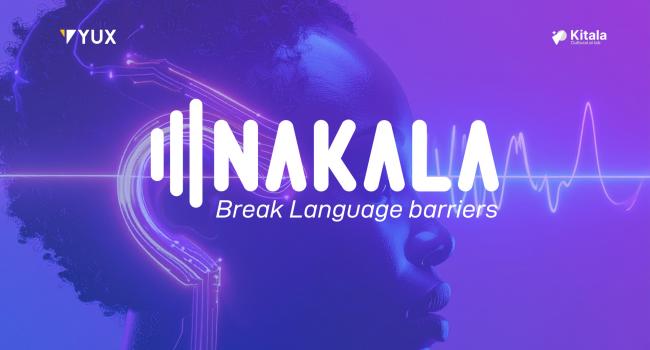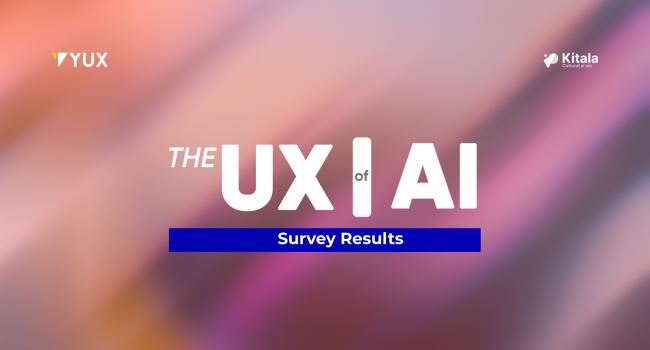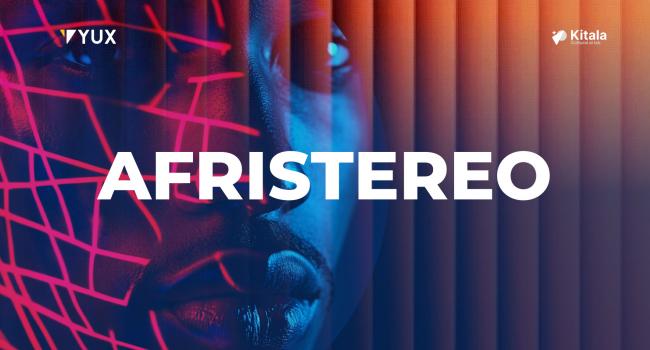Introduction
In an effort to collaborate with young people and their families to build age-appropriate privacy, safety and well-being across Meta technologies, Meta founded and supports the Trust, Transparency & Control Labs (TTC Labs). The goal of this initiative is to use a multidisciplinary research approach that invites youth, parents and experts to participate in Meta’s design process to better meet their needs. In order to learn more about the TTC Labs initiative, please visit their official website.
This case study examines the contributions of YUX Design agency to the global impact of the TTC Labs initiative, which took place in 10 countries across the world. YUX Design led the research in Senegal and Côte d’Ivoire. The core goals of this initiative were to understand youth and parent needs for online supervision experiences.
Research methodology
In order to reach the research goals, the YUX team utilized two methods, including 1 on 1 interviews, where we had discussions with the teenagers and guardians, and co-design sessions, where we brought in groups of teenagers and guardians to collaborate and explore opportunity areas related to the initiative. Finally, we facilitated an expert session where we shared and discussed key insights from the research with stakeholders from academia and the government. This project spanned over 4 months.
To highlight the voices of different groups, we recruited participants based on the following criteria:
- Diversity of family composition
- Socio-economic background
- Digital Literacy
The major goal for the interview sessions was:
- For the teens
- Understand the challenges they face due to the low digital literacy of their guardians
- Learn why and how teens self-monitor, and discover the features that help them do so
- Understand teens' perspectives on "parental control" and the value Meta can bring
- For the guardians:
- Understand current concerns about their teens' use of social media
- Analyze parents' needs for assistance in better understanding teens' social media activities
- Explore monitoring options for different types of teen-guardian relationships
- Explore the impact of guardians' level of digital literacy and socio-economic status on teen-guardian relationships
- Understand the role of mediators in balancing teen autonomy and parental control
During the interviews conducted with the teenagers, it was very important to us to ensure that we simplified the content and research questions in order to aid understanding on the teens’ side. Our goal was to have coherent and honest conversations with teens in a manner that was most comfortable for them to comprehend. We achieved this goal of simplification by using analogies, relating the questions to personal experience and using language familiar to them. That being said, we were also cautious to avoid oversimplifying the questions and falling into the trap of asking leading or worse still, redundant questions. The simplification of the research questions was also done during the guardian interviews since this research involved a diverse profile coming from various educational backgrounds. Shout out to our team members, Kalama HAFISOU and Aissatou DIONE, who led these interviews and had the versatility to ask the right questions and facilitate coherent conversations, regardless of the participants’ age or educational level.
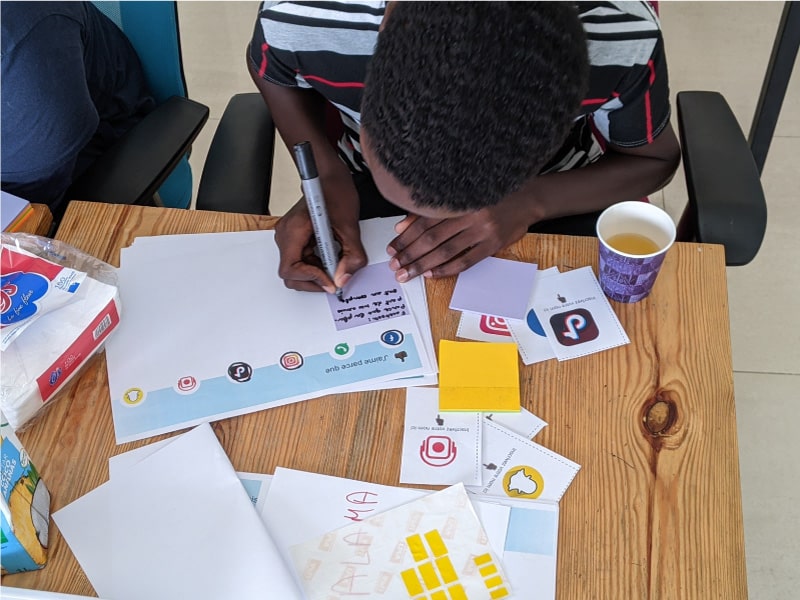
The interviews included 8 teens and 8 guardians from Côte d'ivoire and Senegal. Some of the interviews were conducted in person while others were conducted online, depending on the availability of the participants. All conversations were had in French. After each interview, the YUX team gathered together online to discuss some of the key insights and synthesize the information we had gotten. We found this method to be effective as it prevented us from being overwhelmed with a plethora of information while synthesizing data.
While the initial plan for the project was to conduct just the co-design sessions, the YUX research team was inclined to conduct interviews first as a preliminary step before the co-design sessions. The reason for this decision was to use the insights gathered from the interviews to inform the questions and discussion points that would then be explored in the co-design sessions. And indeed this was exactly the outcome! Hearing the pain points and some of the worries teens and guardians had regarding the use of social media during the interviews allowed us to come up with opportunity areas that were further explored during the co-design. All in all, our decision to use the insights from the interviews to inform the methodology of the co-design sessions were far from futile.
Though we thoroughly enjoyed conversing with the teens and guardians during the interviews, we were definitely stoked for the co-design sessions! These sessions took place shortly after synthesizing the data from the interviews. A total of 8 two-hour long co-design sessions were conducted, 4 sessions with teens in groups of 3-4 and 4 sessions with guardians in groups 3-4. These sessions were evenly distributed between Senegal and Côte D’ivoire.
A lot of planning went into ensuring we facilitated insightful sessions. First, we looked through the data we had gotten from the interviews and used those conversations to inform some of the discussion points in the co-design session. We also ensured we found suitable and comfortable settings to facilitate these sessions as well as refreshments that could be enjoyed by the participants while the sessions were going on. We also prepared the material to be used for the co-design sessions. In this case, it was markers, some blank sheets of paper and lots of post-its! Next step was recruiting the teens for the co-design sessions. We worked together with the Meta team to scout for teens and guardians for the co-design sessions.
The sessions with the teenagers were broken down into various aspects:
- Introduction and icebreaker: First was the introduction whereby the YUX team members introduced themselves to the participants and vice versa. Afterwards we had a fun icebreaker where we played the two truths and a lie game.
- General discussion on parental control: We then went into a general discussion on parental controls and what that looks like for the participants in the context of the country in which they were residing (Senegal and Côte d’Ivoire).
Teen writing down thoughts on parental control:
- The “Points of disagreement” activity: We then asked the teens to write down some points of disagreements between themselves and their guardians regarding their use of social media. The teens were asked to reflect on some ground rules their guardians have regarding their use of social media platforms and ways in which these rules are enforced.
- The “Sacrificial concept” activity: Afterwards, we had the “sacrificial concept” activity where teens were asked to identify some of the parental controls they would be okay with and what compensations they would like to have these controls. The question asked here was “If you decide to give your parents some control, what would you like to have in return”. We got some interesting insights from these specific questions!
- The “My first job” activity: Finally, we had the “My first Job” activity where the teenagers were asked to imagine they were tasked with coming up with potential ways to improve online privacy for Meta. We also got a lot of interesting ideas here as well!
Examples of some activities from the Co-design sessions with the teens The co-design sessions with the guardians had a similar format to that of the teenagers. However, the discussions and activities were slightly different. The guardians were first asked to reflect on their worries regarding their teenager’s online safety. Afterwards, they were asked to identify some online activities that were acceptable and not acceptable for their teenagers to engage in. Similar to the “sacrificial concept” activity done with the teens, the guardians were also asked to identify some online activities they would be okay with their teens engaging in and what compensations they would like in return for this liberty given to their teens.
Co-design session with parents and guardians of teenagers
Another aspect of this research we were quite deliberate about was ensuring that the content was localized to fit into the African context. The TTC Labs research on parental control and teen digital privacy is one that has been carried out in various countries. In preparation for this project, we were provided with aggregate, draft insights from previous countries as examples of research done within the various countries as examples.
While these examples were useful in guiding our own research within Cote d’ivoire and Senegal, we still needed to ensure that the methods we were using and questions being asked fit within the African context. For example, we needed to make sure the terms that were used were familiar to the teenagers and guardians. We also ensured that the activities that we chose were ones that our participants could relate to (such as the “Sacrificial concept” activities). Even the illustrations that were used during these sessions fit into the contexts of Senegal and Côte d’Ivoire.
Key Insights
The output of the synthesis and analysis phase was an in depth report detailing personas, insights and possible recommendations. The main personas that emerged for teens are outlined in the illustration below, we have also outlined some interesting profiles in more detail-
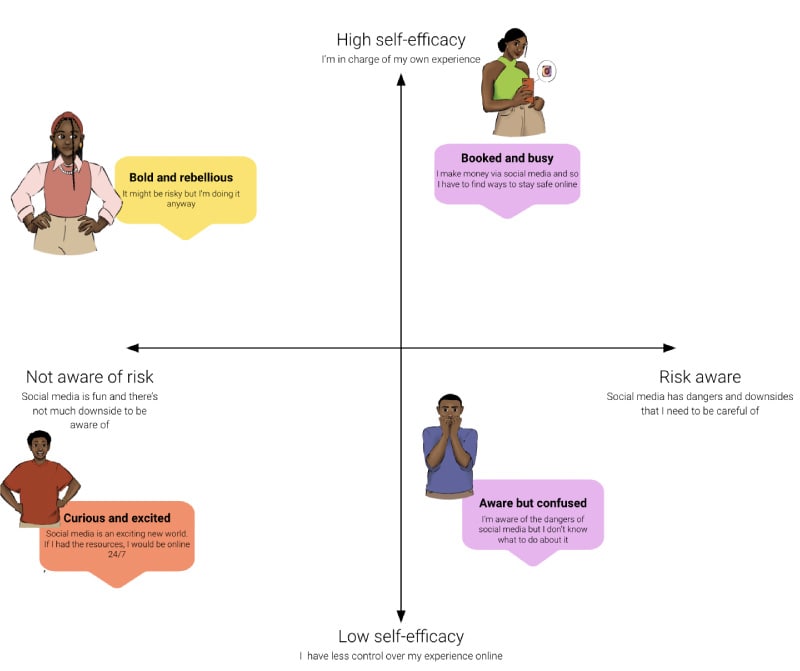
In addition to these personas, we also found that teens in both countries talked about being worried about the possibility of having their social media accounts hacked/information leaked. Teens also shared their worries about coming across unsolicited explicit content and cyberbullying.
Most of these worries teens have regarding social media are mainly related to personal past experiences or experiences of their friends. Furthermore, teens in both countries also reported that they believe their parents/guardians might trivialize their worries regarding potential downsides of social media and so may having such conversations with them. This response has led many teens to rely on their discretion when dealing with social media. Based on the above personas of the teens, some of the needs identified is reflected in the figure below.
The main personas that emerged for parents/guardians are outlined in the illustration below-
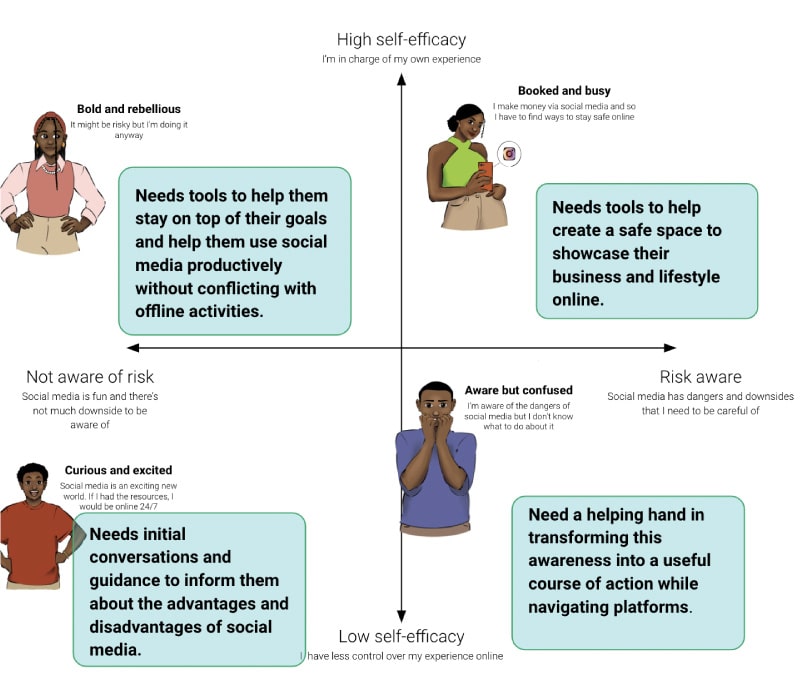
At the end of the project, we held a virtual expert session with Meta based on aggregate research insights for members of academia, civil society and government in SEN and CDI.
Challenges and Reflections
As you know any project comes with its own challenges and this one won’t be the exception. Here are some main challenges that we faced during the project and how we overcome them:
- Recruitment and logistics constraints: The recruitment phase of the project coincided with the Eid holiday in Senegal. This period is typically quite busy for both the guardians and teens. Hence, it was quite difficult getting the availability of potential participants and scheduling interviews and workshops. Even with the support of Meta during the recruitment phase, we still had a hard time scheduling participants. A big shout to our research operations team that came through in ensuring we had sufficient participants for this research. A lesson learnt here is that having a considerable buffer time is significant during research because who knows what could happen!
- Research ethics: conducting with participants under 18: Research ethics is a significant aspect of conducting any form of research. It is even more critical when conducting research with participants under 18. There were lots of things we had to consider before recruiting teenagers involved in this research including getting the consent of both the teens and guardians and figuring out age-appropriate incentives. Getting signed consent from both the teens and their respective guardians took some time and was quite challenging. However, we were able to pull through and get consent from both parties right in time. In terms of compensation, we ensured we also informed the guardians of the sum of money that was being given to the teenagers beforehand.
- Language barrier: Another challenge we faced was the language barrier. Given that this project was conducted in Senegal and Côte d'ivoire, the research insights were in French. Not all members of the YUX team and the TTC labs team who worked on this initiative were fluent in french. So, the insights had to be translated to English to aid understanding. Also, some of the participants in Senegal could only communicate in Wolof and so that added another level of translation that was needed. Kudos to French speaking Yuxies who took the time to translate these insights!
Conclusion
In a nutshell, this project highlights the importance of collaboration especially in a blended research team as we had. Navigating interviews in Wolof and French, sharing research insights in English and presenting final findings in French to clients and expert teams could seem like a recipe for disaster. Yet, we made it work without losing the core details and insights through constant and intentional communication.
We thoroughly enjoyed the whole process!

